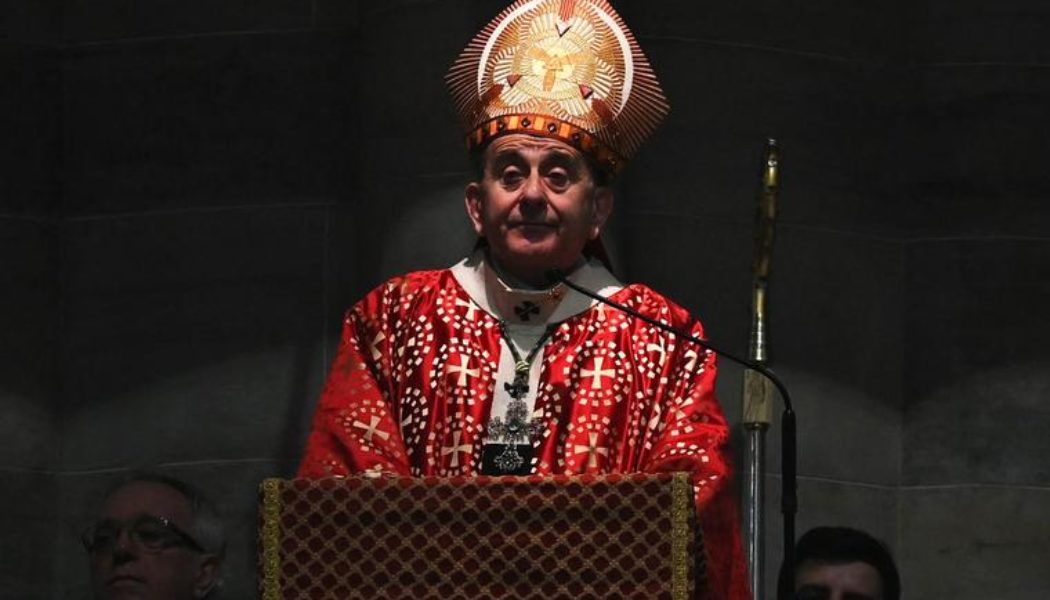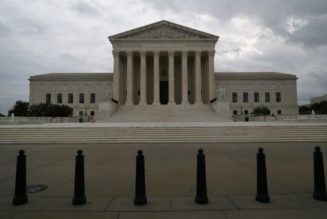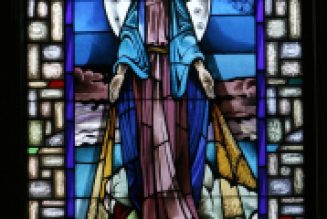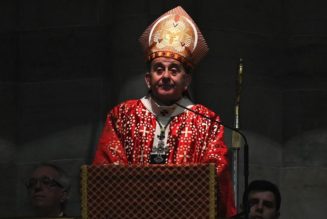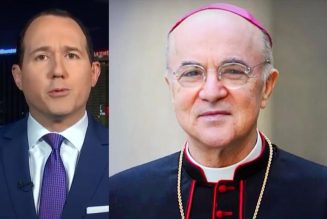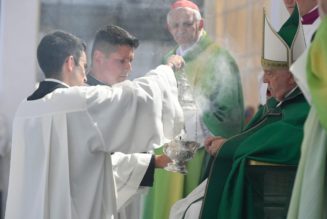
MILAN — The Archbishop of Milan surprised many Catholics with the news that he plans to take part in a seminar in the northern Italian city with the grand masters of Italy’s three Freemasonic lodges, despite the Church’s longstanding censure of Freemasonry.
Archbishop Mario Delpini, Cardinal Francesco Coccopalmerio, president emeritus of the Dicastery for Legislative Texts, and Bishop Antonio Staglianò, president of the Pontifical Academy of Theology, will be among Church representatives attending the closed-door event on Friday to discuss The Catholic Church and Freemasonry.
The Freemasons will be represented by Stefano Bisi, grand master of the Grand Orient of Italy, the country’s largest Freemasonic lodge, and leaders of two other national lodges: the Grand Lodge of Italy and the Grand Regular Lodge of Italy.
Bisi has called the meeting “historic.”
Cardinal Coccopalmerio’s participation is of interest. He was an auxiliary bishop of Milan when Cardinal Carlo Maria Martini was archbishop of the diocese. The late Jesuit cardinal was known to be close to the Freemasons, who paid a warm tribute to him as a “man of dialogue” when he died in 2012.
Writing in the Italian Catholic daily La Nuova Bussola Quotidiana, editor-in-chief Riccardo Cascioli noted that since Cardinal Gianfranco Ravasi wrote a conciliatory letter to Freemasons in 2016, “opportunities for meetings, promoted by Freemasonry or by some dioceses, have multiplied, and are continually growing in stature, as the Milan initiative testifies.”
Since Clement XII’s papal bull In Eminenti Apostolatus Specula of 1738, Catholics have been forbidden from joining the Masons, and the Vatican has issued many negative pronouncements against the secret society — almost 600 magisterial documents in total.
The Catholic Church considers Freemasonry to be, among other grave problems, a corruption of Christianity, that it practices rituals that are inimical to Catholicism, that its principles are irreconcilable with the Catholic faith and that it contains a strong inclination toward anti-Catholicism.
In a 1983 declaration approved by Pope St. John Paul II, Cardinal Joseph Ratzinger reasserted that the Church’s “negative judgment” on Masonry remained “unchanged” since Masonic principles “have always been considered irreconcilable with the doctrine of the Church and therefore membership in them remains forbidden.”
“The faithful who enroll in Masonic associations are in a state of grave sin and may not receive Holy Communion,” Cardinal Ratzinger added. However, neither that declaration nor the 1983 Code of Canon Law imposed the penalty of excommunication on Catholics belonging to the Masons — something that had been in force since Clement XII’s papal bull.
Still, joining a lodge continues to be officially banned in the Catholic Church and in November the Vatican’s Dicastery for the Doctrine of the Faith released a document reaffirming that Catholics are forbidden from becoming members.
The document, signed by Pope Francis and DDF prefect Cardinal Victor Fernández, was written in response to a bishop from the Philippines who had expressed concern at the growing number of Catholics in his diocese who have been taking part in Freemasonry and asked for suggestions for how to respond pastorally.
The dicastery’s response called on the bishops to devise “a coordinated strategy” to promote catechesis “in all parishes regarding the reasons for the irreconcilability between the Catholic faith and Freemasonry,” according to CNA.
Pope Francis has occasionally been vocally critical of the secret society. Speaking in 2015 on a visit to Turin, a city well known for its ties to Freemasonry, he recalled that at the end of the 19th century “Freemasonry was in full swing,” helping to make it “one of the ugliest times and the ugliest places in the history of Italy.” In 2013, he criticized the presence of “Masonic lobbies” within the Church.
Masonry-Friendly Pontificate?
But this pontificate has also drawn noticeable approval from Italian lodges. This became particularly apparent in 2020 when Francis’s Human Fraternity document, co-signed with the Grand Imam of Al-Azhar University, received a ringing endorsement from Bisi’s Grand Orient Lodge. The document, read an article in its quarterly magazine, was “innovative” and a “slow-release drug” that could herald a “new era” and represent a “turning point for a new civilization.”
Freemasons in other parts of the world have also welcomed other initiatives of this pontificate, such as when Spanish Freemasons congratulated the Pope on his encyclical Fratelli Tutti (Brothers All), saying the Church had finally embraced “universal fraternity, the great principle of modern Freemasonry.” By 2017, this pontificate had reportedly already received some 62 messages of public support from various Freemasonic figures and lodges.
In a Feb. 14 statement posted on the Grand Orient Lodge website, Bisi noted “various ups and downs” in relations with the Catholic Church over the past 50 years. “Tenuous openings were followed by rigid closures,” he said.
Significantly, Bisi said a dialogue between Freemasonry and the Church began in the 1960s, with the then-grand master of his lodge, Giordano Gamberini and his successor Lino Salvini, had an exchange with Pauline Father Rosario Esposito.
“Meetings, discussions … then stopped,” Bisi said, but now “they can start again,” and he recalled an open letter, penned by Cardinal Ravasi and addressed to “Dear Brother Masons” published on Feb. 14, 2016.
The then-president of the Pontifical Council for Culture said the Church’s declarations underlining Freemasonry’s incompatibility with the faith “do not impede dialogue” with Masonry on areas such as “works of charity, the fight against materialism, human dignity, and knowledge of each other.”
Quoting documents including one from the German bishops’ conference issued in 1980, the cardinal recommended “going beyond reciprocal ‘hostility, insults and prejudices.”
Referring to that letter and dialogue that proceeded since then, Bisi said in his Feb. 14 statement that from a “varied Masonic panorama,” it is possible to “find common values with those of the Catholic world.
“It would be good to start from there,” he said, “from what unites.”
Despite obvious press interest, media will not be allowed at the event which will take place at the Ambrosianeum Cultural Foundation, and attendance will be restricted.
Those invited to attend will be members of the respective lodges and the organizers, the Socio-Religious Research and Information Group (GRIS), a private association of Italian Catholics approved by Italy’s bishops’ conference that conducts research into religions, sects and phenomenology.
The organization has “long been involved with Freemasonry,” wrote Cascioli, adding that it has “already organized several meetings in various parts of Italy with the stated goal of getting to know one another, well before Cardinal Ravasi’s intervention.”
‘They Have Everything to Gain’
GRIS’ national secretary, Giuseppe Ferrari, said he believed Freemasonry’s “rites and rituals” are likely to again emerge as a chief impediment to a “softer relationship” and the lodges will either have to “eliminate these rites or nothing will change.”
But Cascioli said this was already obvious and so he questioned the need to “multiply meetings in which to tell each other how incompatible we are.”
“The truth is,” Cascioli continued, “gestures are worth much more than words, and that is why Masonic lodges, with the Grand Orient Italy in the lead, are very interested in this dialogue: they have everything to gain because the impression given to the public is that after centuries of condemnation, there is not only the possibility of dialogue but also the possibility of sharing some values.” Being invited to such public events, Cascioli added, also serves to “clean up” Freemasonry’s image as a “secret sect.”
As for the Church, he said it has always been open to encounter anyone, but it is Freemasonry that has “always regarded the Church with hostility,” and views any form of dialogue “as an attempt to neutralize that claim to Truth that the Church proclaims.”
“It is therefore not surprising that these possibilities for dialogue are multiplying at a time when relativism has taken root even among many pastors of the Church,” Cascioli concluded. “And it will not be enough to leave journalists outside the door to hide this reality.”
